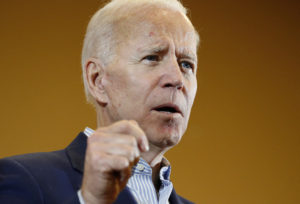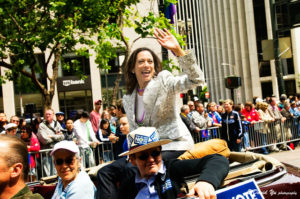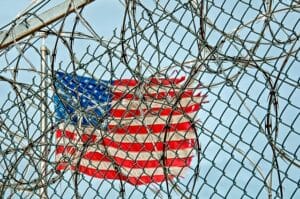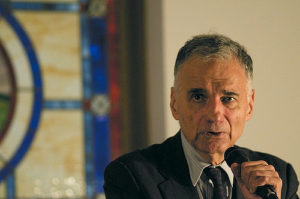Shaka Senghor: Out of ‘the Hole’ and Into the Light
After 19 years behind bars, including seven in solitary confinement, the best-selling author works for criminal justice reform—and for those he left behind. Joi Ito / Flickr (CC-BY 2.0)
Joi Ito / Flickr (CC-BY 2.0)
The United States has 2.2 million prisoners—25 percent of the global prison population. Shaka Senghor was one of them for 19 years, and he spent about seven of those in solitary confinement. Senghor says his experience taught him two things: Prisons are a business, and prisons do not rehabilitate.
Senghor grew up in Detroit, surrounded by poverty, violence, fear and hopelessness. A victim of gun violence, he became a perpetrator of that violence and went to prison on a murder conviction when he was 19 years old. Since being released at 38, Senghor has become a leading advocate of criminal justice reform and a mentor to young people and those currently in prison. He met activist and CNN political commentator Van Jones at the MIT Media Lab and now works with him and others on #cut50, a bipartisan initiative to safely halve the U.S. prison population by 2025.
Senghor, author of the New York Times best-selling memoir “Writing My Wrongs: Life, Death, and Redemption in an American Prison,” sat down with Truthdig in San Francisco when he was in town to do a talk with Jones as part of the Commonwealth Club’s Inforum series. During the interview, Senghor talked about how reading and writing kept him going in solitary, why he works for criminal justice reform and what he thinks needs to be done, and how to listen to kids rather than just talking at them.
How did art and literature make a difference to you in prison?
The particular art form I chose was writing, and it made a major difference to me in allowing me to explore ideas, to challenge how I saw myself, and how I saw others. It helped me break through the dysfunctional environment I was in and articulate some things I was experiencing. It also allowed me to work in collaborative spaces with other men who were inside. Just being able to be creative in an environment where most everything else is suppressed was definitely something that kept me going.
How were you able to keep going in solitary confinement?
The thing that kept me strong and kept me with my mental faculties intact was reading. I read stories about Nelson Mandela and Malcolm X—people who had gone through some of the stuff I was experiencing at the time who were able to break through. I know one of things Nelson Mandela would read was the poem “Invictus,” so I began to read that poem whenever I found myself going through difficult times. That was how I dealt with it.
The other part was writing—I started a journal when I was in solitary, and I wrote my first book in solitary. Having an outlet made it doable. But it’s an extremely tough environment to survive. You have to be a little bit stubborn, which I am—I refused to let the system break me down, I refused to let my conditions turn me into something I know I wasn’t. It’s very hard because there’s high-level mental illness in that environment and being aware that the environment was designed to break you down, that kept me on my toes. Whenever I felt myself being faced with depression, I would just grab a book and read something that inspired me to stay strong and focused.
How did you go from getting out of prison to where you are now?
I got out of prison on June 22, 2010, and I came out with a plan. I planned for my life after prison far before I got out. I started taking writing seriously around 2001. I knew I wanted to work in the community, work with young men and women who were smart kids who just grew up in some very painful environments, so I began to do that in Detroit as soon as I got out. I knew I wanted to pursue a career as a writer, so I found different ways to do that. As a result of the work I was doing in literature and youth mentoring, I ended up winning some awards. I won a fellowship at MIT Media Lab and a fellowship at Kellogg, which exposed me to other opportunities. That kept me moving forward.
Were you also planning to work on criminal justice reform when you got out?
I decided very early on that I had a responsibility to my friends who I left behind. I grew up with men who were still incarcerated. I couldn’t get out and just leave without expressing to the world what was happening with them. When I was in solitary, the abuses I saw take place happened to men suffering from very clear mental health issues, I couldn’t get out [of] there and not articulate their pain. I couldn’t get out here and not give voice to what they were going through because I think it’s one of the saddest things and one of our greatest shames that we have people with serious mental illnesses being treated in the manner they are being treated, so I couldn’t in good conscience walk out and not articulate their pain and their misery.
What makes the biggest difference when you talk to kids—what gets through to them?
… [O]ne of the things that gets through to them is they understand I come from where they come from, and what I do more than talk is I actually listen. I don’t think we listen enough because as adults sometimes we think we know a lot, and we have to tell them everything we know. Kids are very wise, and they have a comprehensive understanding [of] what’s going on in the world around them. Sometimes they just need somebody to listen to them from a space of understanding and empathy as opposed to a space of judgment. … I mentor through social media, … I write Facebook posts. It’s important to kids to connect in spaces that matter to them.What about when you go to the White House or talk to people in power?
What I think is really important is to make the human connection. It doesn’t matter if you’re sitting in the White House or you’re standing on the corner of a block, we’re all human. If we can stay connected to that human thread, it allows us to be more effective as policymakers, and it allows us to be more effective in our own communities, and I think people are starting to hear that. We have a choice in what kind of men and women we want to see return to the community. We have choices in terms of coming up with alternatives to incarceration in the first place, but in order to exercise those choices, we have to tap into our humanity.
We have to realize this is a human issue—it isn’t a crime issue. It’s a human issue in the sense that hurt people hurt people. We’re dealing with some men and women who are coming from some very painful life experiences, and we have to create the structural support to ensure that when men and women are hurting … they get the help they need to avoid taking the path I took.
What about people’s urge to punish others? How do you change that?
I get that people have that emotional reaction and they’re hurting. I always tell people you have to think about what you want the outcomes to be. If you want this person not to hurt anybody again and be responsible and accountable, you have to come up with a model that encourages that behavior. Punishment doesn’t do that. Punishment further hurts people who are already extremely damaged. If you begin to nourish the best in them, you can produce different outcomes. It’s proven that the idea of painful punishment and degrading treatment does not encourage rehabilitation.
What are the strategies of #cut50 to reduce our prison population?
There are multiple strategies. One is to encourage policymakers to make smarter policies when it comes to sentencing. Mandatory minimums have not worked, and they’re very racially biased. They’ve taken all the power out of the hands of judges when it comes to sentencing. Another is to decriminalize mental illness, which is a large segment of the prison population. Work to ensure that re-entry initiatives are taking place inside prison to reduce the 70-percent recidivism rate, which is really a 70-percent failure rate. Then coming up with alternatives to incarceration. We over-incarcerate in this nation, which has led us to having this massive system because we over-criminalize everything.
What is most hopeful to you?
… [It’s] that we’re having a conversation across party lines and across different spectrums of society. It’s not just politicians who are thinking about making a change; it’s entertainers and activists and musicians and people in every major sector in Silicon Valley who are really concerned about what’s happening, and they’re lending their voice to it, so that’s very encouraging. Anytime you get somebody like Oprah Winfrey interviewing somebody like myself on this issue, that’s a major leap. You get people like [Virgin Group founder and philanthropist] Richard Branson who’s come out in support of changes in policy and [entrepreneur and co-founder of Def Jam Recordings] Russell Simmons—all of these people who are super-well-accomplished and may not have personal investment, but they do have a human investment. That makes me very optimistic that we will turn this thing around.
Your support matters…Independent journalism is under threat and overshadowed by heavily funded mainstream media.
You can help level the playing field. Become a member.
Your tax-deductible contribution keeps us digging beneath the headlines to give you thought-provoking, investigative reporting and analysis that unearths what's really happening- without compromise.
Give today to support our courageous, independent journalists.









You need to be a supporter to comment.
There are currently no responses to this article.
Be the first to respond.